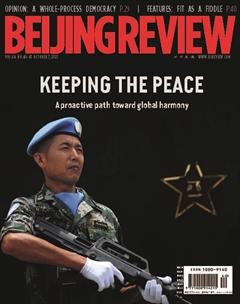NEW DIMENSIONS
By Ong Tee Keat
The active involvement of China in UN peacekeeping operations in the past three decades has earned it the status of global peace provider. Ever since China first deployed troops to the UNs blue helmets in 1990, when it sent five military observers to the Middle East, its commitment to serving the wellbeing of humanity through UN peacekeeping remains a key initiative showcasing the countrys soft power.
Peacekeeping has undeniably been an integral part of Chinas endeavor in global multilateral commitment. This is demonstrated by its largest troop contribution to the UN peacekeeping force among the permanent members of the UN Security Council, with 50,000 peacekeepers on 25 missions. The ChinaUN Peace and Development Fund has provided $67.7 million for 80 projects related to peacekeeping operations since President Xi Jinping first announced the fund in 2015. China is now the second largest contributor to the UN peacekeeping budget.
Marching forward
Perhaps the peace-intent norms entrenched in Chinas cultural DNA might not be well understood by those who advocate military intervention. Nonetheless, the Chinese perspective of peace-building, characterized by no military intervention as well as a respect for the host states territorial sovereignty, may provide a viable alternative model to the existing UN peacekeeping protocol. In this respect, China could take matters one step further by widening its horizons on peacekeeping, moving from a sheer troop and budget supplier to one contributing to normative change. After all, the prevailing protocol is not carved in stone, but instead should evolve with the times and the changing geopolitical landscape.In reality, peacekeeping should no longer confine itself to preserving a superficial interim ceasefire in the conflict zone. More importantly, the essence of peacekeeping lies in the building of lasting postconflict peace in the war-torn region. However, this might be a tall order to achieve without any political solution meeting the demands of all stakeholders. In this context, building a consensus through consultation and negotiation is the only viable avenue for the peace formula to work. No imposition of whims and fancies courtesy of any outside interventionist could ever result in lasting peace. Much less the condescending directives from the intervening party all set to bring the warring factions to their knees.
Under such circumstances, more often than not, the interests of the people—one of the key stakeholders—are not factored into the political settlement equation. This “convenient oversight” might incite instability that can rock the fragile peace brokered. To the proponents of human rights, is it not an outright breach of the peoples fundamental right to survival, if the peace brokers and peacekeepers were to turn a blind eye to the dire need for normalcy among those trapped in the throes of conflict? Their entitlement to post-conflict livelihood is as indisputable as any other human right, albeit different from those prioritized by liberal democracies in the West.

